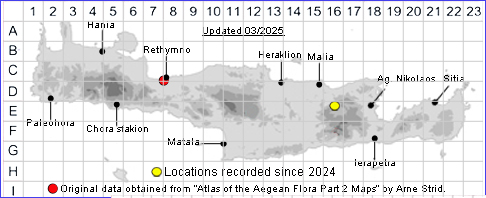
SPECIES DESCRIPTION
CALEPINA IRREGULARIS
Family and Genus:- See- CRUCIFERAE
Common Names:- White ball mustard.
Homotypic Synonyms:- Laelia irregularis, Myagrum irregulare.
Meaning:- Calepina (L) An Adansonian name perhaps relating to Aleppo.
Irregularis (L) Not of the rules, with irregularly sized parts i.e. the
petals.
General description:- Slender short to tall, erect or spreading, hairless annual.
Stems:-
1) 15-80 cm, usually branched near the base.
Leaves:-
1) Basal, obovate, entire to lyrate-pinnatifid, petiolate.
2) Cauline, amplexicaul with acute, patent auricles.
Flowers:-
1) Racemes ebracteate, much elongating in fruit.
2) Petals white, with a short claw or cuneate at the base. 2 mm, the 2 outer longer
2·5-3 mm.
3) Sepals erecto-patent.
4) filaments without appendages.
5) Fruiting pedicels 4-12 mm, slender, erecto-patent, arcuate.
Fruit:-
1) Silicula 2·5-4 x 2-3 mm, ovoid-globose to ellipsoidal, shortly beaked, 4-veined,
reticulate-rugose when dry.
Key features:-
1) Upper segment of fruit beaked, or with a distinct persistent style.
2) Cauline leaves amplexicaul, with acute auricles.
3) Plant green, glabrous or sparsely hairy.
4) Silicula with a short, broad, obtuse beak;
5) Petals unequal, the inner distinctly longer than the outer.
Habitat:- Alluvial flats, seasonally damp meadows, stream-banks olive groves,
roadsides and field margins. 0-800 m.
Distribution:- Widespread and common throughout the Mediterranean. Introduced
on Crete, very limited distribution. Rare.
Flowering time:- Mar-May.
Photo by:- Dr. Armin Jagel
